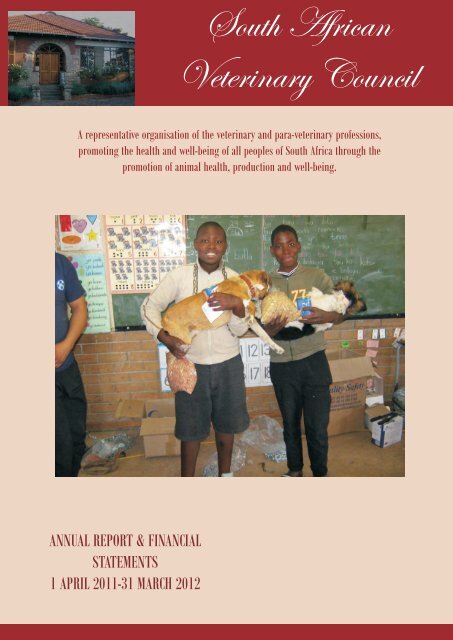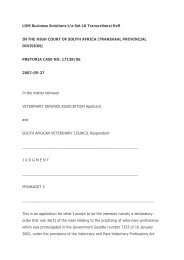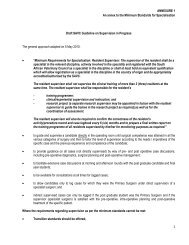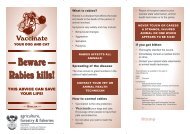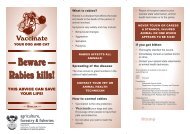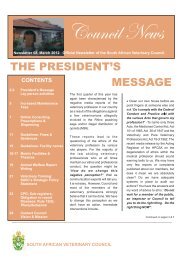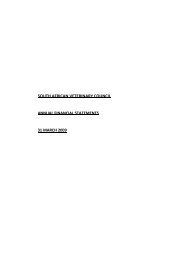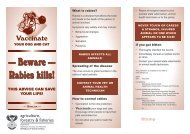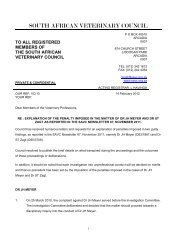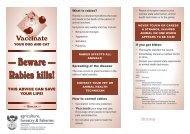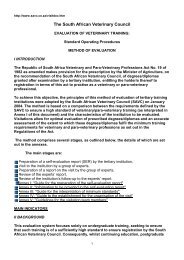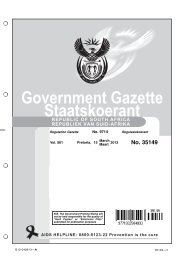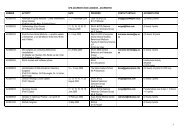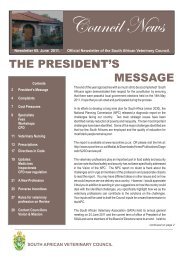Annual Report - the South African Veterinary Council
Annual Report - the South African Veterinary Council
Annual Report - the South African Veterinary Council
You also want an ePaper? Increase the reach of your titles
YUMPU automatically turns print PDFs into web optimized ePapers that Google loves.
<strong>South</strong> <strong>African</strong> <strong>Veterinary</strong> <strong>Council</strong> <strong>Annual</strong> <strong>Report</strong> and Financial Statements 2011-2012<br />
SOUTH AFRICAN VETERINARY COUNCIL<br />
High Standard <strong>Veterinary</strong> Practice<br />
<strong>Annual</strong> <strong>Report</strong> for <strong>the</strong> period<br />
1 April 2011 – 31 March 2012<br />
874 Church Street<br />
Lisdogan Park<br />
Arcadia<br />
0083<br />
P O Box 40510<br />
Arcadia<br />
0007<br />
www.savc.org.za<br />
savc@savc.org.za<br />
Tel: 27(012) 342 1612<br />
Fax: 27 (012) 342 4354<br />
1
<strong>South</strong> <strong>African</strong> <strong>Veterinary</strong> <strong>Council</strong> <strong>Annual</strong> <strong>Report</strong> and Financial Statements 2011-2012<br />
THE SOUTH AFRICAN VETERINARY COUNCIL<br />
The <strong>Annual</strong> <strong>Report</strong> for <strong>the</strong> period 1 April 2011 to 31 March 2012 is submitted to <strong>the</strong> Minister in terms of Section<br />
17 of <strong>the</strong> <strong>Veterinary</strong> and Para- <strong>Veterinary</strong> Professions Act, No 19 of 1982.<br />
<strong>Council</strong><br />
1 April 2011 to 31 March 2012<br />
Dr R Moerane (President)<br />
Dr AP de Vos (Vice President)<br />
Dr JR Adam<br />
Mr HJ Arendse<br />
Dr AM Banderker<br />
Dr GAP Carlisle<br />
Dr ST Cornelius<br />
Ms N Kadwa<br />
Sr T Lotter<br />
Dr CP Marwick<br />
Mr JJ Müller<br />
Prof TL Nedambale<br />
Dr BR Ntshabele<br />
Dr DJ Odendaal<br />
Mr J Oosthuizen<br />
Dr JA Pretorius<br />
Dr I Sonntag<br />
Dr J van Heerden<br />
Dr BA Wenhold<br />
IN OFFICE<br />
Mrs C E Pienaar (Registrar) (31 March 2011- 11 July 2011);<br />
Mrs L Havinga (Acting Registrar) 11 July 2011-31 March 2012;<br />
Mrs S Dowlath-Singh (Director, Legal Affairs)<br />
AUDITORS<br />
C Kotzen and Associates<br />
Registered Accountants and Auditors<br />
Chartered Accountants (S.A.)<br />
Dr Rebone Moerane<br />
________________________<br />
President<br />
Mrs Lynette Havinga<br />
_____________________<br />
Acting Registrar<br />
2
<strong>South</strong> <strong>African</strong> <strong>Veterinary</strong> <strong>Council</strong> <strong>Annual</strong> <strong>Report</strong> and Financial Statements 2011-2012<br />
EXECUTIVE SUMMARY<br />
The <strong>South</strong> <strong>African</strong> <strong>Veterinary</strong> <strong>Council</strong> (SAVC) performed its core functions in terms of <strong>the</strong> <strong>Veterinary</strong> and Para-<br />
<strong>Veterinary</strong> Professions Act, Act 19 of 1982. The information in this report confirms how <strong>the</strong> <strong>Council</strong> exercised its<br />
core and o<strong>the</strong>r functions in line with its objects as follows:<br />
• regulate <strong>the</strong> practising of <strong>the</strong> veterinary professions and para-veterinary professions and <strong>the</strong> registration of<br />
persons practising such professions;<br />
• determine <strong>the</strong> minimum standards of tuition and training required for degrees, diplomas and certificates<br />
entitling <strong>the</strong> holders <strong>the</strong>reof to be registered to practise <strong>the</strong> veterinary professions and para-veterinary<br />
professions;<br />
• exercise effective control over <strong>the</strong> professional conduct of persons practising <strong>the</strong> veterinary professions and<br />
para-veterinary professions;<br />
• determine <strong>the</strong> standards of professional conduct of persons practising <strong>the</strong> veterinary professions and paraveterinary<br />
professions;<br />
• encourage and promote efficiency in and responsibility with regard to <strong>the</strong> practice of <strong>the</strong> veterinary<br />
professions and para-veterinary professions;<br />
• protect <strong>the</strong> interests of <strong>the</strong> veterinary professions and para-veterinary professions and to deal with any matter<br />
relating to such interests;<br />
• maintain and enhance <strong>the</strong> prestige, status and dignity of <strong>the</strong> veterinary professions and para-veterinary<br />
professions and <strong>the</strong> integrity of persons practising such professions;<br />
• advise <strong>the</strong> Minister in relation to any matter affecting a veterinary profession or a para-veterinary profession;<br />
The SAVC remained focused on its mission to “promote food security/safety in all sectors of <strong>the</strong> economy and<br />
develop and promote preventative medicine/ disease strategy at farm level including subsistence farmers” and<br />
reviewed and implemented policies in support <strong>the</strong>reof. The same matters will be addressed in this report as<br />
reported on in <strong>the</strong> 2010 annual report. Subsequent to <strong>the</strong> 2010 report <strong>Council</strong> met on two occasions with <strong>the</strong><br />
Deputy Minister of Agriculture, Forestry and Fisheries, Minister Dr Pieter Mulder on 10 August 2011 and<br />
3 February 2012 respectively. The matters brought to <strong>the</strong> Deputy Minister’s attention in essence <strong>the</strong> following:<br />
• One health is <strong>the</strong> collaborative effort of multiple disciplines -- between Human Medicine, <strong>Veterinary</strong><br />
Medicine, and <strong>the</strong> Environmental Sciences – locally, nationally, and globally, towards optimal health for<br />
people, animals and environment. Emphasis has been placed on <strong>the</strong> need for collaborative efforts to<br />
ensure food safety and security for <strong>the</strong> people of <strong>South</strong> Africa;<br />
• Inadequate numbers of veterinarians working in <strong>the</strong> field of production animals and veterinary public<br />
health is a world-wide problem and applies to regulatory services [state veterinarians], veterinary<br />
research e.g. Onderstepoort <strong>Veterinary</strong> Institute [OVI], vaccine production, Onderstepoort Biological<br />
Products [OBP] and private practice [rural veterinarians]. Veterinarians can <strong>the</strong>refore be classified as a<br />
scarce skills profession. This statement is based on <strong>the</strong> many applications received annually for special<br />
dispensations [authorisation & competence specific registration];<br />
• Animal health technicians [AHTs] – AHTs have not been identified as being in short supply, but an<br />
imbalance exists in <strong>the</strong> distribution of AHTs between provinces. However, without an adequate<br />
epidemiological study into <strong>the</strong> needs of <strong>the</strong> country training institutions are unable to assess <strong>the</strong> number<br />
of students <strong>the</strong>y have to train to ensure that services are accessed;<br />
• The challenges were listed as follows:<br />
Lack of <strong>Veterinary</strong> Control of Medicines which are regulated by Act 101 of 1965 & Act 36 of 1947;<br />
Inadequate enforcement of existing legislation;<br />
Conflicting and impractical legislation;<br />
3
<strong>South</strong> <strong>African</strong> <strong>Veterinary</strong> <strong>Council</strong> <strong>Annual</strong> <strong>Report</strong> and Financial Statements 2011-2012<br />
Illegal activities by lay persons and professionals not registered with <strong>the</strong> SAVC [animal or natural<br />
scientists, medical doctors, pharmacists];<br />
Inadequate access to veterinary services by certain groups of society;<br />
Slow transformation of veterinary services, in particular, in <strong>the</strong> rural areas;<br />
Lack of veterinary involvement in development projects funded by <strong>the</strong> state;<br />
Concerns regarding inadequate delivery of services by State <strong>Veterinary</strong> Services;<br />
Lack of planning to act on trans-frontier disease outbreaks; and<br />
Lack of government support for and interest in- <strong>Veterinary</strong> Research and Technology development;<br />
Due to inadequate vaccine manufacture and non availability of strategic vaccines <strong>the</strong> national herds<br />
are at risk;<br />
• The solutions were identified as follows:<br />
o Centralise <strong>Veterinary</strong> Regulatory Services;<br />
o Develop a national strategy and use available expertise e.g. private practitioners;<br />
o Implement Compulsory Community Service as soon as possible;<br />
o State to recruit and remunerate veterinary professionals adequately;<br />
o Implement a recovery plan and earmark funds for this purpose;<br />
o Improve communication: create a dedicated platform for Ministers; MECs and veterinary<br />
services;<br />
o Synchronise legislation: Ministerial Intervention is required; and<br />
o Consider a Ministry of Animal Health.<br />
The <strong>Council</strong> objectives linked to <strong>the</strong> needs of humans and animals in <strong>South</strong> Africa were inter alia addressed by<br />
<strong>Council</strong> as follows: -<br />
‣ Again, as in <strong>the</strong> previous period, negotiations with various stakeholders with regard to legislation<br />
impacting on <strong>the</strong> veterinary professions - in particular negotiations with:<br />
o <strong>the</strong> Registrar of Act 101 of 1965 with regard to <strong>the</strong> regulation of <strong>the</strong> use of highly scheduled<br />
medicines;<br />
o officials of Act No 10 of 2004 <strong>the</strong> National Environmental Management Act: Biodiversity Act and<br />
<strong>the</strong> requirement that veterinarians have to be in possession of permits; and<br />
o <strong>the</strong> Registrar of Act 36 of 1947 <strong>the</strong> indiscriminate use of medicines in food producing animals;<br />
‣ Preparation of <strong>the</strong> minimum standards for mobile facilities and <strong>the</strong>atres for purposes of Compulsory<br />
<strong>Veterinary</strong> Community Service (CCS) and community engagements for <strong>the</strong> veterinary profession;<br />
‣ Requests for <strong>the</strong> establishment of a stakeholder forum prior to implementation of CCS;<br />
‣ Continued Professional Development (CPD): activities for <strong>the</strong> veterinary profession related to<br />
streamlining <strong>the</strong> process by implementation of a system of random monitoring for <strong>the</strong> future (for this <strong>the</strong><br />
CPD regulations were reviewed); and for <strong>the</strong> veterinary para professions a pilot project phase was<br />
launched;<br />
‣ The <strong>Council</strong>’s strategic planning was brought forward in this period to review: planning included <strong>the</strong><br />
amendment of <strong>the</strong> strategic plan; fast tracking of <strong>the</strong> implementation of <strong>the</strong> strategic plans; <strong>the</strong> planning<br />
included aspects as follow:<br />
o restructure of <strong>the</strong> administration;<br />
o transformation of <strong>the</strong> information and data base;<br />
o development of a marketing strategy to ensure that <strong>the</strong> communication with internal and external<br />
stakeholders is improved;<br />
o to ensure that improved services are rendered; and<br />
4
<strong>South</strong> <strong>African</strong> <strong>Veterinary</strong> <strong>Council</strong> <strong>Annual</strong> <strong>Report</strong> and Financial Statements 2011-2012<br />
o finally to adjust <strong>the</strong> budget accordingly.<br />
The implementation of <strong>the</strong> plan will only take effect in <strong>the</strong> next period of report;<br />
‣ Creating fur<strong>the</strong>r avenues to provide access to veterinary services i.e. draft policies to extend <strong>the</strong><br />
conditions of registration/ authorisation to:<br />
o ensure that services can be rendered where regulatory services are required;<br />
o ensure authorisation agreements with employers are in place; and<br />
o ensure <strong>the</strong> accreditation of veterinarians in community engagement activities.<br />
‣ Investigation and pursuance of <strong>the</strong> illegal activities of lay persons or non- registered professionals selfemployed,<br />
employed within state veterinary services and privately;<br />
‣ Issuing a policy framework for <strong>the</strong> inspectorate and implementing a pilot project;<br />
‣ Issuing a policy declaration on veterinary training in <strong>South</strong> Africa;<br />
‣ Review of <strong>the</strong> fines and penalties relevant for professionals who transgress <strong>the</strong> Act;<br />
‣ Finalising <strong>the</strong> outcomes of visitations to institutions who train animal health technicians; and<br />
‣ Conducting all its functions as prescribed ito <strong>the</strong> Act;<br />
o including facilitation of <strong>the</strong> Amendment Bill;<br />
o various activities relating to <strong>the</strong> promotion of <strong>the</strong> profession especially during <strong>the</strong> World<br />
<strong>Veterinary</strong> Year 2011.<br />
The SAVC has also during this period submitted its input to <strong>the</strong> National Planning Commission of <strong>South</strong> Africa<br />
[NPC] and provided <strong>the</strong> NPC with valuable information of <strong>the</strong> role that <strong>the</strong> veterinary team plays in Food security<br />
for <strong>the</strong> country; Education of <strong>the</strong> people of <strong>the</strong> country; Health, both human and animal health; Spatial planning –<br />
relating to rural development and employment; transport; defence capabilities; climate change and <strong>the</strong> economy.<br />
5
<strong>South</strong> <strong>African</strong> <strong>Veterinary</strong> <strong>Council</strong> <strong>Annual</strong> <strong>Report</strong> and Financial Statements 2011-2012<br />
PRESIDENT’S OVERVIEW<br />
I am pleased to present <strong>the</strong> 2011-2012 annual report of <strong>the</strong> <strong>South</strong> <strong>African</strong> <strong>Veterinary</strong> council. The year 2011 was<br />
a significant year for veterinary science, as <strong>the</strong> whole world took part in celebrating <strong>the</strong> 250 th anniversary of <strong>the</strong><br />
founding of <strong>the</strong> first veterinary school in Lyon, France, and <strong>the</strong>refore of <strong>the</strong> veterinary profession as such.<br />
Despite all <strong>the</strong> challenges experienced by <strong>the</strong> veterinary professions, <strong>the</strong> <strong>Council</strong> administration and <strong>the</strong> <strong>Council</strong><br />
during <strong>the</strong> year 2011, all aspects related to <strong>the</strong> mandate afforded to <strong>the</strong> <strong>Council</strong> were effectively attended to. In<br />
general, <strong>the</strong> members of <strong>the</strong> veterinary professions provided professional services and only a few matters had to<br />
be referred to inquiry bodies for formal hearings. The services were provided by both registered and authorised<br />
professionals. The <strong>Council</strong> currently regulates 2963 veterinarians - of which 143 are specialists - 998 animal<br />
health technicians, 554 veterinary nurses, 224 veterinary technologists and 21 laboratory animal technologists.<br />
One of <strong>the</strong> most serious challenges for <strong>the</strong> <strong>Council</strong> and <strong>the</strong> veterinary fraternity in <strong>the</strong> history of <strong>the</strong> veterinary<br />
professions in <strong>South</strong> Africa which <strong>the</strong> veterinary professions and <strong>the</strong> <strong>Council</strong> had to deal with, was <strong>the</strong> media<br />
allegations relating to <strong>the</strong> involvement of a few members of <strong>the</strong> veterinary profession in Rhino poaching with <strong>the</strong><br />
knowledge of matters available to us two Veterinarians appeared in court on charges related to poaching. The<br />
incidents had a negative impact on <strong>the</strong> image of <strong>the</strong> profession and severely damaged <strong>the</strong> good reputation of <strong>the</strong><br />
veterinary professions in <strong>South</strong> Africa. Various role players in <strong>the</strong> profession including <strong>the</strong> <strong>Council</strong>, had to<br />
respond to many of <strong>the</strong> enquiries related to <strong>the</strong> incidents. There is no doubt that <strong>the</strong> increase in Rhino poaching<br />
in <strong>the</strong> country is unacceptable and in response to <strong>the</strong> threat, <strong>the</strong> veterinary profession responded positively in<br />
participating in various initiatives nationally and internationally to combat and prevent fur<strong>the</strong>r incidences of Rhino<br />
poaching. The initiatives included<br />
• <strong>the</strong> amendment of <strong>the</strong> rules to ensure that veterinarians became <strong>the</strong> end-users of opioids (chemical<br />
immobilisation drugs used to anaes<strong>the</strong>tise wild animals);<br />
• participation in <strong>the</strong> raising of funds;<br />
• developing guidelines on for <strong>the</strong> management of injured Rhinos;<br />
• research conducted in collaboration with various role players;<br />
• participation in <strong>the</strong> debates organised by <strong>the</strong> Portfolio Committee on Water and Environmental affairs;<br />
• DNA profiling for forensic testing and individual identification of rhino horn.<br />
The <strong>the</strong>n Registrar, Mrs C E Pienaar tendered her resignation in May 2011 and her last working day was 11 July<br />
2011. Taking into consideration that she had only been in <strong>the</strong> employment of <strong>the</strong> SAVC for 6 months and <strong>the</strong><br />
o<strong>the</strong>r challenges identified, a strategic session was held during January 2012 to develop various intervention<br />
strategies. The newly identified strategies will lead to a transformed organisation which does not lose focus of its<br />
mandate and always ensures that both <strong>the</strong> veterinary professions and <strong>the</strong> public are protected and well informed.<br />
The relations between <strong>the</strong> <strong>Council</strong> and <strong>the</strong> Department of Agriculture, Forestry and Fisheries improved with no<br />
less than two meetings held with <strong>the</strong> Deputy Minister, Dr P Mulder to discuss various aspects related to <strong>the</strong><br />
veterinary professions particularly legislation which have a negative impact on <strong>the</strong> profession, <strong>the</strong> control of<br />
veterinary medicines and stock remedies, <strong>the</strong> efficiency of state veterinary services, compulsory community<br />
services and food security in <strong>the</strong> country.<br />
The <strong>Council</strong> also participated in various strategic meetings and conferences. These included among o<strong>the</strong>rs-<br />
• <strong>the</strong> World congress held in <strong>South</strong> Africa. For <strong>the</strong> first time in <strong>the</strong> history of our county, <strong>the</strong> congress of <strong>the</strong><br />
World <strong>Veterinary</strong> Association was held in our country during October 2011 and we thank all role players<br />
in particular <strong>the</strong> organising committee of <strong>the</strong> <strong>South</strong> <strong>African</strong> <strong>Veterinary</strong> Association for ensuring that <strong>the</strong><br />
congress was successful , as it also formed <strong>the</strong> closing ceremony of <strong>the</strong> world wide celebrations of<br />
international Year of <strong>the</strong> Veterinarian;<br />
6
<strong>South</strong> <strong>African</strong> <strong>Veterinary</strong> <strong>Council</strong> <strong>Annual</strong> <strong>Report</strong> and Financial Statements 2011-2012<br />
• <strong>the</strong> joint meeting of Chairpersons of <strong>Veterinary</strong> Statutory Bodies and Deans of <strong>Veterinary</strong> schools within<br />
<strong>the</strong> Sou<strong>the</strong>rn <strong>African</strong> and East <strong>African</strong> countries to discuss <strong>the</strong> Day-One competency for veterinarians<br />
and <strong>the</strong> future of veterinary training;<br />
• meeting with <strong>the</strong> Registrar of Medicines (Act 101) and Registrar of Act 36 of 1947; and<br />
• meeting with <strong>the</strong> security cluster to deal particularly with Rhino poaching and illegal use of medicines.<br />
These various activities were achieved because of a committed administration led by <strong>the</strong> Acting Registrar, Mrs L<br />
Havinga, comprehensive inputs from <strong>the</strong> various veterinary professions, commitment of <strong>the</strong> <strong>Council</strong>lors and <strong>the</strong><br />
support of <strong>the</strong> Department of Agriculture, Forestry and Fisheries. Looking forward, we hope to give structure to<br />
all <strong>the</strong> envisaged strategic changes, so as to serve <strong>the</strong> professions and <strong>the</strong> public even better, and empower <strong>the</strong><br />
animal health professions to reach new heights.<br />
Rebone Moerane<br />
7
<strong>South</strong> <strong>African</strong> <strong>Veterinary</strong> <strong>Council</strong> <strong>Annual</strong> <strong>Report</strong> and Financial Statements 2011-2012<br />
Administration<br />
The management of <strong>the</strong> administration continued under <strong>the</strong> leadership of Mrs L Havinga (Acting Registrar). Mrs<br />
C E Pienaar (Registrar) resigned within <strong>the</strong> first two months of this period of report.<br />
In-house training and skills development are ongoing activities as part of management responsibilities.<br />
This period was marked by <strong>the</strong> evaluation of <strong>the</strong> administration and <strong>the</strong> effectiveness of its services in a changing<br />
environment. The outcomes of <strong>the</strong>se evaluations will only bear fruit in <strong>the</strong> next period of report.<br />
Monitoring and Examinations Co-ordinator, Ms G St Francis resigned at <strong>the</strong> end of this period of report.<br />
2. <strong>Council</strong> and its Executive<br />
<strong>Council</strong><br />
1 April 2011 to 31 March 2012<br />
Dr R Moerane (President) (Member of <strong>the</strong> Executive Committee) Elected Member: <strong>Veterinary</strong><br />
profession<br />
Dr AP de Vos (Vice President) Elected Member: <strong>Veterinary</strong> profession<br />
Dr J Adam Elected Member: <strong>Veterinary</strong> profession<br />
Mr HJ Arendse [appointed June 2011] Elected Member: Laboratory animal technology<br />
Dr AM Banderker Designated by <strong>the</strong> Minister<br />
Dr GAP Carlisle Elected Member: <strong>Veterinary</strong> profession<br />
Dr ST Cornelius Designated by <strong>the</strong> Minister<br />
Ms N Kadwa Designated by <strong>the</strong> Minister on account of knowledge of law<br />
Sr T Lotter Elected Member: <strong>Veterinary</strong> Nursing profession<br />
Dr CP Marwick Elected Member: <strong>Veterinary</strong> Profession<br />
Mr JJ Müller Elected Member: <strong>Veterinary</strong> technology<br />
Prof TL Nedambale Designated by <strong>the</strong> Minister [non veterinary professional]<br />
Dr B Ntshabele Designated by <strong>the</strong> Minister representing <strong>the</strong> Department of Agriculture, Forestry and<br />
Fisheries<br />
Dr DJ Odendaal Elected Member: <strong>Veterinary</strong> profession<br />
Mr J Oosthuizen Elected Member: Animal health technician<br />
Dr JA Pretorius [was re-instated in this period of report] Designated by <strong>the</strong> Minister<br />
Dr I Sonntag Representing <strong>the</strong> Faculty of <strong>Veterinary</strong> Science, UP<br />
Dr J van Heerden Representing <strong>the</strong> <strong>South</strong> <strong>African</strong> <strong>Veterinary</strong> Association<br />
Dr BA Wenhold Designated by <strong>the</strong> Minister<br />
2.2 <strong>Council</strong> Meetings<br />
• 7 June 2011<br />
• 8 June 2011 [Strategic planning session]<br />
• 25 October 2011<br />
• 25 & 26 January 2012 [Strategic planning session]<br />
• 7 February 2012<br />
8
<strong>South</strong> <strong>African</strong> <strong>Veterinary</strong> <strong>Council</strong> <strong>Annual</strong> <strong>Report</strong> and Financial Statements 2011-2012<br />
Apologies received:<br />
• 7 June 2011: Mr JJ Müller<br />
• 8 June 2011: Mr JJ Müller and Ms N Kadwa.<br />
• 25 October 2011: Ms N Kadwa<br />
• 25 January 2012: Dr BR Ntshabele<br />
• 7 February 2012: Dr CP Marwick<br />
2.3 Executive Committee<br />
2.3.1 Members<br />
1 April 2011 -31 March 2012<br />
Dr R Moerane, President<br />
Dr AP De Vos, Vice President<br />
Dr C P Marwick, Member<br />
2.3.2 Meetings of <strong>the</strong> Executive Committee<br />
Represented by <strong>the</strong> full committee and/or <strong>the</strong> President, Vice President, Registrar, <strong>Council</strong>lors<br />
• 15 April 2011: Student initiative “ I want to be a veterinarian”<br />
• 9 June 2011: Onderstepoort <strong>Veterinary</strong> Students <strong>Council</strong> (OPVSC)<br />
• 9 June 2012: <strong>South</strong> <strong>African</strong> <strong>Veterinary</strong> Association (SAVA)<br />
• 20 July 2011: Wildlife Ranchers Association of SA (WRSA)<br />
• 20 July 2011: Allied Health Professions <strong>Council</strong> of SA (AHPCSA)<br />
• 10 August 2011: Dr P Mulder (Deputy Minister of Agriculture, Forestry & Fisheries)<br />
• 6 October 2011: Medicines Control <strong>Council</strong> (MCC)<br />
• 11 October 2012: National Planning Commission, Agriculture<br />
• 12 October 2012: <strong>Veterinary</strong> Statutory Boards [VSBs] Sou<strong>the</strong>rn and Eastern Africa<br />
• 24 October 2011: Professional Hunters Association SA (PHASA)<br />
• 24 October 2011: SA <strong>Veterinary</strong> Laboratory Scientific Forum (SAVLSF)<br />
• 24 October 2011: <strong>South</strong> <strong>African</strong> <strong>Veterinary</strong> Association (SAVA)<br />
• 24 October 2011: Animal Welfare Organisations (AWOs)<br />
• 8 November 2011: National Consumer Commission (NCC)<br />
• 1 February 2012: SA Society of Physio<strong>the</strong>rapists (SASP)<br />
• 1 February 2012: Medicines Control <strong>Council</strong> (MCC)<br />
• 3 February 2012: Dr P Mulder (Deputy Minister of Agriculture, Forestry & Fisheries)<br />
3. Continued Professional Development (CPD): CPD Accreditation Committee<br />
3.1 Members<br />
Dr J van Heerden (Chairperson)<br />
Prof R Kirberger<br />
9
<strong>South</strong> <strong>African</strong> <strong>Veterinary</strong> <strong>Council</strong> <strong>Annual</strong> <strong>Report</strong> and Financial Statements 2011-2012<br />
3.2 Meetings held during this period<br />
The committee under <strong>the</strong> leadership of Dr J van Heerden, with Prof R Kirberger as member, continued to<br />
evaluate various CPD activities for accreditation. The committee continued to liaise electronically.<br />
3.3 Developments<br />
Compliance with <strong>the</strong> requirements of CPD for <strong>the</strong> veterinary profession was audited as follows:<br />
• 2006-2009: 2318 veterinarians had to comply with CPD requirements for this cycle.<br />
47 veterinarians did not comply. Disciplinary action took place and 12 veterinarians out of 15 paid fines.<br />
• 2007-2010: 107 veterinarians had to comply with CPD requirements for this cycle.<br />
5 veterinarians did not comply. These veterinarians had been given a fur<strong>the</strong>r opportunity to ensure<br />
compliance and/or apply for deferment by <strong>the</strong> end of 2011. The 5 veterinarians who did not comply had<br />
disciplinary action instituted against <strong>the</strong>m by <strong>the</strong> <strong>Council</strong>. The next audit for this group will be reported to<br />
<strong>Council</strong> in 2014 as <strong>the</strong> next cycle [2010-2013] for this group ends in 2013;<br />
• 2008-2011: 120 veterinarians had to comply with CPD requirements for this cycle.<br />
58 veterinarians did not comply. These 58 registered veterinarians were given a fur<strong>the</strong>r opportunity to log<br />
<strong>the</strong>ir CPD points and/or apply for deferment to ensure compliance with CPD. 26 Veterinarians did not<br />
comply and will have disciplinary action instituted against <strong>the</strong>m by <strong>the</strong> <strong>Council</strong>. The next audit for this<br />
group will be reported to <strong>Council</strong> in 2015 as <strong>the</strong> next cycle [2011-2014] for this group ends in 2014; and<br />
• 2009-2012: 2620 veterinarians had to comply with CPD requirements for this cycle.<br />
Although it appeared that 1861 veterinarians did not comply, <strong>the</strong> points logging was not finalised at 31<br />
March 2012 and <strong>the</strong>se registered veterinarians will be given a fur<strong>the</strong>r opportunity to log <strong>the</strong>ir CPD points<br />
and/or apply for deferment to ensure compliance with CPD. The next audit for this group will be reported<br />
to <strong>Council</strong> in 2016 as <strong>the</strong> next cycle [2012-2015] for this group ends in 2015.<br />
A total number of 135 applications for <strong>the</strong> accreditation of courses were considered during <strong>the</strong> period 1<br />
April 2011 to 31 March 2012 with ultimately 122 being accredited. Four (4) applications were not<br />
accredited and nine (9) applications were incomplete.<br />
10
<strong>South</strong> <strong>African</strong> <strong>Veterinary</strong> <strong>Council</strong> <strong>Annual</strong> <strong>Report</strong> and Financial Statements 2011-2012<br />
A list of accredited courses is continuously updated on <strong>the</strong> SAVC website and members of <strong>the</strong> profession<br />
can inform <strong>the</strong>mselves accordingly. Members are required to log <strong>the</strong> CPD points accumulated by <strong>the</strong>m<br />
by <strong>the</strong> end of <strong>the</strong> relevant three-year cycle.<br />
<strong>Council</strong> finalised <strong>the</strong> new policy guideline for para-veterinary professionals in October 2009 along similar<br />
guidelines as for <strong>the</strong> veterinary profession. Implementation will only commence after <strong>the</strong> completion of a<br />
pilot project which had commenced in August 2010 and which is foreseen to be extended.<br />
4. Education Committee<br />
4.1 Members of Committee<br />
1 April 2011 – 31 March 2012<br />
Dr AP de Vos (Chairperson)<br />
Mr HJ Arendse<br />
Dr KE Joubert<br />
Sr T Lőtter<br />
Mr JJ Müller<br />
Dr NVH Nombekela-Madiba<br />
Dr DJ Odendaal<br />
Mr J Oosthuizen<br />
Dr I Sonntag<br />
Prof GE Swan<br />
Co-opted members<br />
Dr A Bartkowiak Higgo (UNISA)<br />
Ms C Boshoff (TUT)<br />
Prof B Dzoma, The late Prof Dzoma passed away in July 2012 (NWU)<br />
4.2 Meetings<br />
9 May 2011<br />
11 July 2011<br />
24 January 2012<br />
11
<strong>South</strong> <strong>African</strong> <strong>Veterinary</strong> <strong>Council</strong> <strong>Annual</strong> <strong>Report</strong> and Financial Statements 2011-2012<br />
Apologies received:<br />
9 May 2011 Dr A Bartkowiak-Higgo and Mr JJ Müller<br />
11 July 2011 Dr A Bartkowiak-Higgo and Dr NVH Nombekela-Madiba<br />
24 January 2012 Prof GE Swan; Dr NVH Nombekela-Madiba and Prof B Dzoma<br />
The Education Committee made recommendations on various issues relating to visitations, curriculum<br />
developments, monitoring and examinations. Developments and recommendations took place, inter alia, as<br />
follows:<br />
VISITATIONS<br />
The Faculty of <strong>Veterinary</strong> Science, University of Pretoria (UP) 2013<br />
The visitation to <strong>the</strong> Faculty of <strong>Veterinary</strong> Science, UP was postponed from end 2012 to early 2013. By <strong>the</strong> time<br />
of <strong>the</strong> visitation to <strong>the</strong> Faculty [May 2013], most of <strong>the</strong> curriculum changes (now a 6 year programme) would be<br />
completed and <strong>the</strong> programme would be more streamlined. Both <strong>the</strong> veterinary programme [BVSc] and <strong>the</strong><br />
veterinary nurse programme [DVN] would be relevant and it was decided that Dr D Odendaal, <strong>the</strong> leader of <strong>the</strong><br />
visitation team, and two o<strong>the</strong>r suitable team members would do ground work on veterinary nursing at <strong>the</strong> Faculty<br />
for a day or two before <strong>the</strong> visitation week starts. They would <strong>the</strong>n report to and brief <strong>the</strong> full team when it<br />
convenes and decide with <strong>the</strong> team what <strong>the</strong> team should be exposed to during <strong>the</strong> assigned visitation week and<br />
what outstanding concerns need to be debated and assessed. Dr Odendaal reviewed <strong>the</strong> Self-Evaluation <strong>Report</strong><br />
(SER). Current guidelines and main indicators had to be adapted in time for <strong>the</strong> 2013 visitation. The budget was<br />
accepted by <strong>Council</strong>.<br />
The College of Agriculture and Environmental Sciences (CAES), UNISA<br />
UNISA’s report was accepted and <strong>the</strong> qualification accepted for continued registration. All remedial actions<br />
should be carried out by 2013. None of <strong>the</strong> actions related to deficiency one deficiencies but included <strong>the</strong><br />
following matters:<br />
Development of a CPD programme;<br />
Representation on <strong>the</strong> Advisory Boards had to include private practitioners, and state veterinarians from<br />
all provinces;<br />
The Work Integrated Learning [WIL] workshops had to include a larger stakeholder representation than<br />
<strong>the</strong> Advisory Board;<br />
12
<strong>South</strong> <strong>African</strong> <strong>Veterinary</strong> <strong>Council</strong> <strong>Annual</strong> <strong>Report</strong> and Financial Statements 2011-2012<br />
Concern was expressed in respect of <strong>the</strong> Open Distance Learning, practical work experience had to be<br />
assessed and Day 1 Competencies had to be addressed;<br />
The post for a WIL co-ordinator had to be advertised and an appointment had to be made and<br />
Memorandums of Understanding had to be entered into;<br />
The outdated <strong>Veterinary</strong> Jurisprudence module had to be updated (with input sourced from o<strong>the</strong>r<br />
institutions) and should be completed by <strong>the</strong> end of 2013;<br />
The knowledge-base of <strong>the</strong> lecturers of local Sou<strong>the</strong>rn <strong>African</strong> animal health matters was critical<br />
especially when it came to <strong>the</strong> practical hands-on “clinical” training and Unisa had to ensure that its<br />
lecturers complied with <strong>the</strong> requirements;<br />
Communication skills had to be addressed; and<br />
Student complaints had to be addressed.<br />
The Faculty of Agriculture, Science and Technology (FAST), Mafikeng Campus, North West University<br />
(NWU)<br />
Areas of concern were identified during <strong>the</strong> visitation in 2010, and NWU’s detailed response was reported at <strong>the</strong><br />
<strong>Council</strong> meeting held on 1 June 2011. <strong>Council</strong> resolved to approve <strong>the</strong> recommendation that two delegates of<br />
<strong>the</strong> original visitation team to NWU, Messrs D Kriel and D Visser, would conduct a fact-finding visit within <strong>the</strong> first<br />
semester of 2012 to evaluate progress, engage students and ascertain whe<strong>the</strong>r all aspects were being<br />
addressed according to <strong>the</strong> timelines given by <strong>the</strong> NWU. The visit took place in February 2012 and <strong>the</strong> report<br />
stated that a number of issues needed to be addressed before <strong>the</strong> end of 2012.<br />
A generally positive report was received after a visit on 5 December 2011 to <strong>the</strong> Hospital facility and only minor<br />
deficiencies needed to still be addressed. However, one of <strong>the</strong> main concerns related to <strong>the</strong> farm where training<br />
should take place as animal health technicians work with mainly production animals and not companion animals.<br />
The outcome of <strong>the</strong> re-visit and <strong>the</strong> rectification of a number deficiency one matters will have to be addressed<br />
before 2013.<br />
EXAMINATIONS<br />
2011 Examination results were approved by <strong>Council</strong> on 25 October 2011.<br />
There is ongoing co-operation between <strong>the</strong> Faculty of <strong>Veterinary</strong> Science, UP and <strong>the</strong> SAVC re <strong>the</strong> databank of<br />
examination questions. A proposal was tabled, and accepted by <strong>Council</strong>, that <strong>the</strong> <strong>Council</strong> registration<br />
examinations be used for final year students, once ownership of <strong>the</strong> databank had been confirmed and an<br />
agreement entered into.<br />
13
<strong>South</strong> <strong>African</strong> <strong>Veterinary</strong> <strong>Council</strong> <strong>Annual</strong> <strong>Report</strong> and Financial Statements 2011-2012<br />
Examination panels 2011<br />
Examination Officer – Dr DE Holm<br />
<strong>Veterinary</strong> Examinations 2011<br />
Computer Based Examination<br />
Moderators - Session 1: Prof L Coetzee and Prof N Duncan<br />
Moderator - Session 2: Prof KP Pettey<br />
Oral/Practical Examination<br />
Moderator: Dr H Annandale<br />
Examiners<br />
Panel 1: Clinical procedures Dogs and Cats – A: Dr M Peck and B: Dr M Meyer<br />
Panel 2: Clinical procedures Horses – A: Dr TG Casey and B: Dr S Higgerty<br />
Panel 3: Clinical procedures Production Animals - A: Dr E du Preez and B. Dr DJ Odendaal<br />
Panel 4: Sample ID and practical procedures, Pathology & VPH - A: Dr H Nel and Dr J Williams.<br />
Workstations: Technician: Ms E Goosen<br />
<strong>Veterinary</strong> Nursing Examinations 2011<br />
Computer Based Examination<br />
Moderator - Session 1: Sr AE Botha<br />
Moderator - Session 2: Sr AE Botha<br />
Oral/Practical Examination<br />
Moderator: Sr A E Botha<br />
Panel 1: Theatre Practice - Sr R Fourie<br />
Panel 2: Surgical Nursing - Dr AM Kitshoff<br />
Panel 3: Medical Nursing - Dr V McClure<br />
Panel 4: Radiography - Ms C Makanjee<br />
Panel 5: Anaes<strong>the</strong>sia - Prof F Stegmann<br />
Panel 6: Reproductive Nursing - Dr D Steckler<br />
Animal Health Technicians Examination 2011<br />
14
<strong>South</strong> <strong>African</strong> <strong>Veterinary</strong> <strong>Council</strong> <strong>Annual</strong> <strong>Report</strong> and Financial Statements 2011-2012<br />
Computer Based Examination<br />
Sessions I & II: Dr P Koen [Scientific content] / Mr J Oosthuizen [Format of questions] – Moderator<br />
Sessions I & II: Dr BH Mlilo; and Mr D Visser - Examiners<br />
Oral/Practical Examination<br />
Moderator: Mr J Oosthuizen<br />
Panel 1: Dr L Cele - Examiner<br />
Panel 2: Mr P Lourens - Examiner<br />
<strong>Veterinary</strong> Technology (CSR and Full Examination) 2011<br />
Due to <strong>the</strong> large number of unregistered people working as veterinary technologists in laboratories, and <strong>the</strong> effect<br />
this had on laboratory accreditation, a decision was made to allow <strong>the</strong>se persons to sit a Competence Specific<br />
Registration [CSR] examination, to test <strong>the</strong>m on <strong>the</strong> subjects involved in <strong>the</strong> work <strong>the</strong>y actually performed. A total<br />
of fourteen examinations were written. All <strong>the</strong> examination papers had been set by lecturers at Tshwane<br />
University of Technology (TUT), <strong>the</strong> Faculty of <strong>Veterinary</strong> Science, UP and employees of state and private<br />
laboratories. Due to <strong>the</strong> number of candidates enrolled for <strong>the</strong> examination and <strong>the</strong> varied subjects this had been<br />
a major and time consuming exercise to bring persons with non–prescribed qualifications on board. Two venues<br />
were made available to accommodate employers and employees, one in KwaZulu-Natal for 22 candidates and<br />
one in Gauteng for 50 candidates.<br />
Jurisprudence<br />
Examiner: Ms C Boshoff<br />
Moderator: Prof M van Vuuren<br />
Immunology and Serology<br />
Examiner: Ms C Boshoff<br />
Moderator: Ms A Bosman<br />
Toxicology<br />
Examiner: Dr J Kangumba<br />
Moderator: Dr T Gous<br />
Protozoology<br />
Examiner: Mr L Kruger<br />
Moderator: Dr K Junker<br />
Virology<br />
Examiner: Ms A Bosman<br />
Moderator: Ms C Boshoff<br />
15
<strong>South</strong> <strong>African</strong> <strong>Veterinary</strong> <strong>Council</strong> <strong>Annual</strong> <strong>Report</strong> and Financial Statements 2011-2012<br />
Biochemistry<br />
Examiner: Ms R Pieterse<br />
Moderator: Dr C Maritze<br />
Histology<br />
Examiner: Ms F Bothma<br />
Moderator: Mr P Mokonoto<br />
Microbiology/Bacteriology<br />
Examiner: Mr L Gerber<br />
Moderator: Dr M Henton<br />
FULL EXAMINATION<br />
Examiner: Ms C Boshoff<br />
Moderator: Mr F Dreyer<br />
Molecular Biology<br />
Examiner: Ms A Bosman<br />
Moderator: Ms C Boshoff<br />
Haematology<br />
Examiner: Ms S Pretorius<br />
Moderator: Mr F Dreyer<br />
Helminthology<br />
Examiner: Mr J van Rensburg<br />
Moderator: Dr K Junker<br />
NOT WRITTEN<br />
Entomology<br />
Examiner: Mr L Kruger<br />
Moderator: Dr K Junker<br />
Reproduction<br />
Examiner: Ms I Lu<strong>the</strong>r<br />
Moderator: Mr M Smuts<br />
MONITORING STANDARDS: MONITORS’ REPORTS 2010<br />
All reports and comments were accepted for continued registration for <strong>the</strong> veterinary and veterinary para<br />
professions <strong>the</strong> holders of <strong>the</strong> degrees/ diplomas as follows: BVSc degree (UP); DVN (UP); Animal Health<br />
Diploma/Degree (NWU) ( Two subjects to be re-monitored in 2013: Bacterial Diseases and Protozoal, Rikettsial<br />
and Fungal Diseases) , Animal Health Diploma/Degree (UNISA) and <strong>Veterinary</strong> Technology Diploma (TUT). The<br />
subjects that were not monitored during 2011 were referred to <strong>the</strong> monitoring programme for 2012.<br />
16
<strong>South</strong> <strong>African</strong> <strong>Veterinary</strong> <strong>Council</strong> <strong>Annual</strong> <strong>Report</strong> and Financial Statements 2011-2012<br />
MONITORING GUIDELINES<br />
Monitoring guidelines, forms and timelines were in <strong>the</strong> process of being revised after input was solicited from<br />
current and past monitors for suggestions to improve <strong>the</strong> system. The finalisation of review may only take place<br />
in <strong>the</strong> next period of report.<br />
GLOBAL ACCREDITATION<br />
A draft Memorandum of Agreement was drawn up between <strong>the</strong> Royal College of <strong>Veterinary</strong> Surgeons (RCVS)<br />
and <strong>the</strong> <strong>South</strong> <strong>African</strong> <strong>Veterinary</strong> <strong>Council</strong> (SAVC) with <strong>the</strong> aim to work towards a future agreement. This would<br />
entail <strong>the</strong> RCVS acknowledging <strong>the</strong> SAVC visitation process and vice versa so that in future <strong>the</strong> RCVS need not<br />
send its own full visitation team to <strong>the</strong> Faculty of <strong>Veterinary</strong> Science, UP, but may instead send an observer to<br />
join <strong>the</strong> SAVC’s future visits and vice versa. Two members of <strong>the</strong> RCVS would be joining <strong>the</strong> 2013 visitation and<br />
a decision as to whe<strong>the</strong>r an agreement will be entered into will be taken based on <strong>the</strong> success of <strong>the</strong> 2013<br />
visitation.<br />
5. Committee on Fees<br />
5.1 Members of Committee<br />
1 April 2011- 31 March 2012<br />
Dr JR Adam (Chairperson)<br />
Ms N Kadwa<br />
Dr TL Nedambale<br />
Dr IG Sou<strong>the</strong>rn<br />
Dr BA Wenhold<br />
5.2 Meetings<br />
10 May 2011<br />
29 September 2011<br />
Apologies received:<br />
10 May 2011-Prof TL Nedambale; Dr BA Wenhold<br />
As in <strong>the</strong> past <strong>Council</strong> regards <strong>the</strong> Guideline of Tariffs as a means to investigate complaints relating to<br />
overcharging lodged by clients or touting by colleagues. <strong>Council</strong> does not intend to inhibit price competition<br />
between veterinary professionals but to indicate <strong>Council</strong>’s opinion on <strong>the</strong> reasonableness of a fee charged.<br />
Registered Veterinarians are reminded annually by <strong>the</strong> Committee that fee setting is not permitted due to<br />
regulations set by <strong>the</strong> Competition Commission. A meeting was held with <strong>the</strong> Consumer Commissioner to clarify<br />
aspects of practice and liability.<br />
17
<strong>South</strong> <strong>African</strong> <strong>Veterinary</strong> <strong>Council</strong> <strong>Annual</strong> <strong>Report</strong> and Financial Statements 2011-2012<br />
Individual practices subsidise animal welfare organisations. Most practices discount fees for pensioners, disabled<br />
and indigent persons and many activities e.g. community veterinary clinics, sterilisation campaigns and primary<br />
animal health care [PAHC] often take place without payment and/or with discounted fees for <strong>the</strong>se services.<br />
The Committee accepted that <strong>the</strong> number of inputs received was due to <strong>the</strong> streamlining and <strong>the</strong> consultative<br />
process. The fees for 2012 were increased with 8% in both <strong>the</strong> minimum and maximum bands. Fur<strong>the</strong>rmore, a<br />
distinction will not be made for specialist fees but <strong>the</strong> current policy be retained namely specialist services at a<br />
rate of 1.5 times charged by general practitioners was recommended.<br />
The committee resolved to in <strong>the</strong> future meet only once a year.<br />
6. Investigation Committee<br />
6.1 Members<br />
1 April 2011 – 31 March 2012<br />
Dr GAP Carlisle-(Chairperson)<br />
Dr R Mulder<br />
Dr MP Verseput<br />
Dr BM Modisane<br />
6.2 Meetings<br />
• 5 May 2011<br />
• 4 August 2011<br />
• 5 October 2011<br />
• 19 January 2012<br />
Apologies received:<br />
5 October 2011- Dr BM Modisane<br />
Telephonic enquiries relating to complaints were dealt with on a daily basis by <strong>the</strong> Administration as in <strong>the</strong> past<br />
advising prospective complainants on what <strong>the</strong> complaints procedure entails. The information on how to submit a<br />
complaint had been available on <strong>the</strong> website and on request by email, surface mail or facsimile. Members of <strong>the</strong><br />
public have access to a separate area where <strong>the</strong>y can find specific guidelines on how to submit a complaint<br />
and/or and account for assessment. Complainants are encouraged to first discuss <strong>the</strong> matter that has initiated<br />
<strong>the</strong>ir concerns with <strong>the</strong> member concerned, with a view to resolving <strong>the</strong> matter.<br />
Only 62 formal complaints were received and 4 accounts were assessed by <strong>the</strong> committee. All 4 of <strong>the</strong> accounts<br />
were found to be in order by <strong>the</strong> committee.<br />
• The total number of formal complaints for this period : 62<br />
‣ 3 complaints were finalised administratively as complainants did not submit supporting affidavits<br />
‣ 56 complaints were submitted to <strong>the</strong> Investigation committee for consideration<br />
‣ 3 complainants withdrew <strong>the</strong>ir complaints before submission of <strong>the</strong> case to <strong>the</strong> Investigation<br />
committee.<br />
18
<strong>South</strong> <strong>African</strong> <strong>Veterinary</strong> <strong>Council</strong> <strong>Annual</strong> <strong>Report</strong> and Financial Statements 2011-2012<br />
• The committee dealt with <strong>the</strong> 56 complaints as follows:<br />
‣ 15 finalised finding no unprofessional conduct<br />
‣ 0 matters was mediated<br />
‣ 2 matters issuing directives to improve professional conduct<br />
‣ 17 matters referred to formal inquiries<br />
‣ 22 matters required fur<strong>the</strong>r information and should be finalised in <strong>the</strong> next reporting period.<br />
• The 17 matters referred to Inquiry Bodies for formal hearings should be finalised in <strong>the</strong> next reporting<br />
period.<br />
7. Registration & Authorisation Committee<br />
7.1 Members<br />
1 April 2011 – 31 March 2012<br />
Dr BA Wenhold (Chairperson)<br />
Dr A Banderker<br />
Sr T Lőtter<br />
Mr J Oosthuizen<br />
7.2 Meetings held<br />
• 3 May 2011<br />
• 27 September 2011<br />
• 25 January 2012<br />
Apologies received:<br />
There were no apologies.<br />
The Registration and Authorisation Committee dealt with <strong>the</strong> following matters in addition to applications for<br />
authorisation and registration:<br />
• veterinarians involved in animal welfare- <strong>the</strong> guidelines had been reviewed and in particular veterinary<br />
supervision was defined;<br />
• authorisation of animal welfare assistants- <strong>the</strong> guideline documents, especially those concerning <strong>the</strong><br />
use of medicines and assessment criteria, were reviewed;<br />
• animal welfare assistants / veterinary welfare assistants (VWA) - <strong>the</strong> scope and rules for this<br />
prospective veterinary para profession were developed, however <strong>the</strong> scope of practice could not be<br />
finalised in this period of report;<br />
• veterinary clinical facilities, sterilisation campaigns-facilities from which veterinary clinical services<br />
are rendered are required to register with <strong>Council</strong> and where <strong>the</strong> standards for <strong>the</strong>se facilities cannot be<br />
met application for exemption is made based on <strong>the</strong> need. As sterilisation campaigns are undertaken in<br />
areas where <strong>the</strong>re are usually no registered facilities and/or a lack of services exists an increased<br />
number of applications was received for exemption from <strong>the</strong> minimum standards. The guidelines for<br />
sterilisation campaigns and community engagement had been reviewed and finalised in this period of<br />
report. The guideline was published on <strong>the</strong> SAVC’s website (December 2011);<br />
19
<strong>South</strong> <strong>African</strong> <strong>Veterinary</strong> <strong>Council</strong> <strong>Annual</strong> <strong>Report</strong> and Financial Statements 2011-2012<br />
• supervision and assessment - a supervision agreement document was drafted and finalised with <strong>the</strong><br />
purpose that <strong>the</strong> prospective employer, supervisor and employee agree to report to <strong>Council</strong> on <strong>the</strong><br />
activities of authorised persons;<br />
• advertisements- <strong>the</strong> policy relating to <strong>the</strong> publication of an advertisement for <strong>the</strong> services of a suitably<br />
registered veterinary and/or veterinary para professional was amended, finalised, approved by <strong>Council</strong><br />
(October 2011);<br />
• guidelines for authorisation: wildlife immobilisations - <strong>the</strong> guidelines on how to submit an application<br />
requesting <strong>the</strong> inclusion of chemical immobilisation, anaes<strong>the</strong>sia, tranquilisation and sedation of wildlife<br />
as part of <strong>the</strong> extension of conditions for registration of registered animal health technicians and for<br />
authorisation for non registered persons were reviewed and finalised (February 2012);<br />
• authorisation section 23 (1) (c) - <strong>the</strong> guidelines concerning <strong>the</strong> authorisation of persons in key-point<br />
positions were amended to include a requirement that applicants had to pass <strong>the</strong> veterinary<br />
jurisprudence and ethics component of <strong>the</strong> <strong>Council</strong>’s registration examination; and<br />
• authorisation of post-graduate students – A policy was confirmed during this period that students<br />
enrolled for postgraduate qualifications who wished to perform procedures pertaining to <strong>the</strong> veterinary or<br />
para-veterinary profession and work in <strong>the</strong> veterinary profession (e.g. teaching, research or rendering<br />
clinical services) had to in addition be authorised to perform veterinary services.<br />
SAVC Registration Examination Foreign Registered members<br />
<strong>Council</strong> invited registered members who passed <strong>the</strong> SAVC’s registration examination to take an oath similar to<br />
<strong>the</strong> one currently taken by BVSc graduates. The third such oath taking ceremony was implemented on 25<br />
November 2011.<br />
7.3 Registrations, Removals, Renewals and Authorisations<br />
A total of 4760 veterinary and veterinary para professionals were registered with <strong>the</strong> SAVC on 31 March 2012<br />
and 362 persons were authorised to perform veterinary or veterinary para professional services. The<br />
administration encouraged members to register and to maintain <strong>the</strong>ir registration.<br />
1 April 2011– 31 March 2012 (Amended statistics)<br />
Professionals registered/ authorised to perform veterinary /para-veterinary services on 31 March 2012<br />
Professionals<br />
Number<br />
registered<br />
2011<br />
% Number<br />
registered<br />
2012<br />
Veterinarians (including 16 with restricted<br />
2835 59.84 2824 59.10<br />
registration)<br />
<strong>Veterinary</strong> Specialists 140 2.9 142 2.97<br />
Animal Health Technicians 993 20.96 998 20.88<br />
Laboratory Animal Technologists 21 0.44 21 0.44<br />
<strong>Veterinary</strong> Nurses 539 11.37 556 11.64<br />
<strong>Veterinary</strong> Technologists 209 4.41 237 4.97<br />
Subtotal 4737 100 4778 100<br />
Persons authorised in terms of section 23(1) 443 362<br />
Total 5180 5139<br />
%<br />
20
<strong>South</strong> <strong>African</strong> <strong>Veterinary</strong> <strong>Council</strong> <strong>Annual</strong> <strong>Report</strong> and Financial Statements 2011-2012<br />
Persons authorised in terms of section 23(1) to renders services of: 2011 2012<br />
Veterinarian 18 18<br />
Animal Health Technician 52 43<br />
Laboratory Animal Technologist 25 20<br />
<strong>Veterinary</strong> Technologist 101 66<br />
<strong>Veterinary</strong> Nurse 4 5<br />
Animal Welfare Assistant 243 210<br />
Total 443 362<br />
Registrations/authorisations and removals from <strong>the</strong> register during 2011/2012<br />
Professions Registrations (Removals) Re-registrations Gains (Loss)<br />
Veterinarian 138 (188) 38 (12)<br />
Competence Specific (Restrict) 1 1<br />
<strong>Veterinary</strong> Specialist 2 - - 2<br />
Animal Health Technician 67 (90) 28 5<br />
Laboratory Animal Technologist - - - -<br />
<strong>Veterinary</strong> Nurse 34 (24) 7 17<br />
<strong>Veterinary</strong> Technologist 41 (17) 4 28<br />
Authorised 2010/2011 Authorisations (Removals) Renewal Gains (Loss)<br />
Veterinarians 22 (24) 2 -<br />
Animal Health Technicians 1 (22) 10 (11)<br />
Laboratory Animal Technologist - (5) - (5)<br />
<strong>Veterinary</strong> Nurses 2 (2) 1 1<br />
<strong>Veterinary</strong> Technologists 9 (69) 25 (35)<br />
Animal Welfare Assistants 27 (121) 61 (33)<br />
Comparison with previous years on 31 March -<br />
Profession 2009 2010 Gain 2011 Gain 2012<br />
(Loss)<br />
(Loss)<br />
Veterinarian (Exclude CSR) 2660 2758 62 2820 (12) 2808<br />
Competence Specific<br />
12 13 2 15 1 16<br />
Registered Veterinarians<br />
<strong>Veterinary</strong> Specialists 129 132 8 140 2 142<br />
Animal Health Technician 938 962 31 993 5 998<br />
Laboratory Animal Technologist 24 24 (3) 21 21<br />
<strong>Veterinary</strong> Nurse 490 510 29 539 17 556<br />
<strong>Veterinary</strong> Technologist 203 200 9 209 28 237<br />
6465 4599 138 4737 41 4778<br />
Authorised i.t.o section 23(1) 503 332 111 443 362<br />
21
<strong>South</strong> <strong>African</strong> <strong>Veterinary</strong> <strong>Council</strong> <strong>Annual</strong> <strong>Report</strong> and Financial Statements 2011-2012<br />
7.4 The following qualifications were accepted during <strong>the</strong> period of report in terms of Section 20 (5) (a)<br />
(b) & (c) to register <strong>the</strong> applicants, after successful completion of <strong>the</strong> examination (year indicated in<br />
brackets if not during this period of report):<br />
<strong>Veterinary</strong> qualifications<br />
1) Zupanc D BVSc University of Belgrade, Serbia, Bosnia<br />
2) De Moura Galvao H DVM, Faculty of <strong>Veterinary</strong> Medicine, University of Lisbon, Portugal<br />
3) Ndlovu D BVSc, University of Zimbabwe<br />
4) Nkhoma JMG BVSc, University of Zimbabwe<br />
5) Stroehle RM DVM, Ludwig Maximilian University of Munich, Germany<br />
6) Miller MA DVM, University of Wisconsin, Madison, USA<br />
7) Sabbe N BVM, Ghent University, Belgium<br />
8) Tshuma T BVSc, University of Zimbabwe<br />
9) Snyder DD DVM, Mississippi State University, America<br />
8. Committee on Specialisation<br />
8.1 Members of <strong>the</strong> Committee<br />
1 April 2011- 31 March 2012<br />
Dr J Pretorius (Chairperson)<br />
Prof R Lobetti<br />
Dr D Miller<br />
Prof HM Terblanche<br />
Prof M Saulez<br />
2.2 Meetings held during <strong>the</strong> period<br />
11 May 2011 (Dr I Sonntag: acting Chairperson for an electronic meeting)<br />
19 October 2011<br />
2.3 Apologies received<br />
None<br />
2.4 Developments and recommendations<br />
The Committee on Specialisation made recommendations on key issues that included matters as follows:<br />
22
<strong>South</strong> <strong>African</strong> <strong>Veterinary</strong> <strong>Council</strong> <strong>Annual</strong> <strong>Report</strong> and Financial Statements 2011-2012<br />
MONITORING STANDARDS<br />
Every second MMedVet examination should be monitored within a 3-year cycle provided that a positive report is<br />
received. Should <strong>the</strong>re be a negative report; <strong>the</strong> examination will be re-monitored each time until <strong>the</strong> report is<br />
positive.<br />
MINIMUM REQUIREMENTS FOR REGISTRATION AS A VETERINARY SPECIALIST<br />
The current Minimum Requirements were declared acceptable and <strong>the</strong> status quo remained. However, if a<br />
particular discipline resolved to add or change any requirements <strong>the</strong>n it should be submitted toge<strong>the</strong>r with a<br />
motivation for consideration by <strong>the</strong> Committee. If approved, <strong>the</strong>n those requirements will be added to <strong>the</strong><br />
minimum requirements as an addendum.<br />
A recommendation was made to <strong>the</strong> registered specialists that a forum be established under auspices of <strong>the</strong><br />
<strong>South</strong> <strong>African</strong> <strong>Veterinary</strong> Association or ano<strong>the</strong>r forum and that <strong>the</strong> specialists met and became more involved<br />
with <strong>the</strong> minimum requirements for specialisation. State veterinarians would again be given an opportunity to<br />
make input and express <strong>the</strong>ir concerns relating to <strong>the</strong> lack of opportunity to in particular specialize in <strong>the</strong> field of<br />
<strong>Veterinary</strong> Public Health. These have been concerns of <strong>the</strong> committee as food safety and security is a major<br />
concern for <strong>the</strong> country.<br />
Workshops on specialisation were held in Gauteng (23 September 2011) and Cape Town (11 October 2011)<br />
respectively. The workshop in Gauteng mainly dealt with <strong>the</strong> internal concerns pertaining to specialisation in<br />
SA, whilst <strong>the</strong> workshop in Cape Town mainly provided an opportunity to share specialisation protocols with<br />
international representatives.<br />
SUPERVISORS: RECOGNITION OF CLINICAL SUPERVISOR FOR MMEDVET TRAINING<br />
As part of <strong>the</strong> transition standards, Dr G Steenkamp, who is not a registered specialist, was accepted as a<br />
clinical supervisor / trainer in <strong>the</strong> maxillofacial component of <strong>the</strong> current MMedVet surgery programme, for a<br />
time limit of 5-years on condition that he remains in <strong>the</strong> employ of <strong>the</strong> Faculty of <strong>Veterinary</strong> Science, UP.<br />
Supervisors would in future be re-assessed on a 5-yearly basis.<br />
23
<strong>South</strong> <strong>African</strong> <strong>Veterinary</strong> <strong>Council</strong> <strong>Annual</strong> <strong>Report</strong> and Financial Statements 2011-2012<br />
CLINICAL RESIDENCY POSTS FOR TRAINING OF VETERINARY WILDLIFE SPECIALISTS<br />
(MMEDVET(Fer))<br />
The request by <strong>the</strong> Faculty of <strong>Veterinary</strong> Science, UP to waive <strong>the</strong> requirement of a mandatory 1-year period of<br />
experience to register for <strong>the</strong> MMedVet (Fer) degree, provided <strong>the</strong> graduate did a 2-year residence period in<br />
SANParks, and register for a minimum of 4 years was not granted.<br />
STANDARDS OF TRAINING: MONITOR REPORTS 2010<br />
MMedVet (Chir) (Small Animals)<br />
The SAVC accepted <strong>the</strong> proposal that due to practical reasons a pool of monitors would be created in future to<br />
ensure that when operations took place any monitor who was available could be appointed.<br />
PEER REVIEW OF QUALIFICATIONS / EXPERIENCE<br />
No applications could be finalised as <strong>the</strong> prospective applicants who indicated <strong>the</strong>ir requests to be recognised<br />
as specialists did not submit <strong>the</strong> full details.<br />
MMEDVET PROGRAMMES 2011<br />
<strong>Council</strong> accepted <strong>the</strong> positive reports for future registration as follows:<br />
MMedVet (Diagnostic Imaging): Prof SS vd Berg<br />
MMedVet (Small Animal Medicine): Dr RG Lobetti<br />
9. Pre- Advice Screening Committee on Inspections<br />
The Inspections Committee did not meet regularly as routine inspections were still pending <strong>the</strong> amendment to <strong>the</strong><br />
Act.<br />
9.1 Members of <strong>the</strong> committee<br />
1 April 2011- 31 March 2012<br />
Dr C P Marwick- Chairperson<br />
Dr A Erasmus<br />
Prof A M Lübbe<br />
Dr L Orsmond<br />
Prof S S van den Berg<br />
24
<strong>South</strong> <strong>African</strong> <strong>Veterinary</strong> <strong>Council</strong> <strong>Annual</strong> <strong>Report</strong> and Financial Statements 2011-2012<br />
9.2 Meetings<br />
14 November 2012<br />
The full Committee met to discuss <strong>the</strong> future of Compulsory <strong>Veterinary</strong> Community Services [CCS] in particular<br />
<strong>the</strong> use of mobile facilities and <strong>the</strong>atres; <strong>the</strong> conditions for CCS and <strong>the</strong> requirements as follows:<br />
• Proper registered facilities have to be in place;<br />
• <strong>Veterinary</strong> functions have to be performed in a professional manner and within <strong>the</strong> confines of <strong>the</strong> <strong>Veterinary</strong><br />
and Para <strong>Veterinary</strong> Professions Act, Act no 19 of 1982. Veterinarians cannot conform to <strong>the</strong> requirements of<br />
<strong>the</strong> Act if facilities are inadequate;<br />
• Adequate security arrangements have to be put in place and <strong>the</strong> CCS veterinarians should not be placed at<br />
risk;<br />
• Accommodation and payment have to be provided for;<br />
• The CCS veterinarians have to be gainfully employed and not sit and do nothing as this would be<br />
counterproductive; and<br />
• CPD has to be complied with.<br />
Mobile Facilities were deliberated and it was concluded that <strong>the</strong> main purpose for <strong>the</strong>se services was to provide<br />
access to indigent communities. Mobile facilities should be used to provide Primary Animal Health Care. Mobile<br />
facilities in o<strong>the</strong>r communities should be an extension of a fully equipped back-up facility.<br />
10. O<strong>the</strong>r appointments confirmed and made during this period<br />
• Dr CP Marwick, Portfolio Finance.<br />
25
SOUTH AFRICAN VETERINARY COUNCIL<br />
ANNUAL FINANCIAL STATEMENTS<br />
31 MARCH 2012
SOUTH AFRICAN VETERINARY COUNCIL<br />
Established under <strong>Veterinary</strong> and Para-<strong>Veterinary</strong><br />
Professions Act, 1982 (Act 19 of 1982)<br />
ANNUAL FINANCIAL STATEMENTS - 31 MARCH 2012<br />
I N D E X<br />
P A G E<br />
<strong>Report</strong> of <strong>the</strong> Independent Auditors 1<br />
Balance Sheet 2<br />
Income Statement 3 - 4<br />
Notes to <strong>the</strong> Financial Statements 5 - 6<br />
The financial statements which appear on pages 2 to 7<br />
were approved by <strong>the</strong> board and are signed on <strong>the</strong>ir behalf<br />
on<br />
PRESIDENT<br />
REGISTRAR
SOUTH AFRICAN VETERINARY COUNCIL<br />
Established under <strong>Veterinary</strong> and Para-<strong>Veterinary</strong><br />
Professions Act, 1982 (Act 19 of 1982)<br />
BALANCE SHEET AT 31 MARCH 2012<br />
Page 2.<br />
Note 2012 2011<br />
ASSETS:<br />
NON-CURRENT ASSETS 3061779 3077992<br />
Fixed Assets 2 2610438 2658039<br />
Investments 3 451341 419953<br />
CURRENT ASSETS 4341836 3359666<br />
Accounts receivable and prepayments 20000 52614<br />
Short term investment and accrued interest 3915795 3210080<br />
Cash at bank 406041 96972<br />
TOTAL ASSETS 7403615 6437658<br />
EQUITY AND LIABILITIES:<br />
ACCUMULATED FUNDS 6024985 5362771<br />
Balance 1 April 5362771 5112901<br />
Net surplus for <strong>the</strong> year 662214 249870<br />
Skills development fund 4 149881 108979<br />
CURRENT LIABILITIES 1228749 965908<br />
Accounts payable 534974 411489<br />
Examination fees in advance 329601 144629<br />
2011 Student registrations 30473 60129<br />
Fees paid in advance 333701 349661<br />
TOTAL EQUITY AND LIABILITIES 7403615 6437658
Page 3.<br />
SOUTH AFRICAN VETERINARY COUNCIL<br />
Established under <strong>Veterinary</strong> and Para-<strong>Veterinary</strong> Professions Act, 1982 (Act 19 of 1982)<br />
INCOME STATEMENT FOR THE YEAR ENDED 31 MARCH 2012<br />
2012 2011<br />
INCOME<br />
Fees - Veterinarians: 3217369 3080825<br />
Registration - Veterinarians 51060 58569<br />
- Specialist 3521 15258<br />
Maintenance fees - veterinarians 3019306 2881324<br />
- specialist 143482 125674<br />
Fees - para-veterinary 906182 833834<br />
Maintenance fees - nurses 264164 234433<br />
- technologist 116175 91369<br />
- laboratory animal technologist 10408 12809<br />
- animal health technicians 484935 455734<br />
Registration - nurses 11237 15089<br />
- technologist 5137 5458<br />
- laboratory animal technologist 0 0<br />
- animal health technicians 14126 18942<br />
Advertising 274252 248615<br />
Application fees 56862 105821<br />
Authorisation fees 105914 98691<br />
Deferment income 439 52193<br />
Dividend received 4164 963<br />
Examination fees 333987 256658<br />
Fines 58250 13500<br />
Insurance recovery 14129 0<br />
Interest received 243194 261593<br />
Overseas certificate 62888 62197<br />
Profit on disposal of unit trusts 0 15477<br />
Sales 27403 31795<br />
Skills levy refund 0 3938<br />
Sponsorship 21930 0<br />
Students 95200 60112<br />
Unrealised gain arising from change in fair value of investments 21624 24120<br />
5443787 5150332<br />
EXPENDITURE: 4781573 4900462<br />
Administration fees 1843569 2386683<br />
Kruger Inc 0 486689<br />
Salaries 1832404 1877641<br />
Investment charges 11165 22353<br />
Audit fees 23500 17500<br />
Bank charges 28740 20894<br />
Data base 7200 0<br />
Depreciation of fixed assets 85656 80253<br />
Carried forward 1988665 2505330
Page 4.<br />
SOUTH AFRICAN VETERINARY COUNCIL<br />
Established under <strong>Veterinary</strong> and Para-<strong>Veterinary</strong> Professions Act, 1982 (Act 19 of 1982)<br />
INCOME STATEMENT FOR THE YEAR ENDED 31 MARCH 2012<br />
-CONTINUED-<br />
2012 2011<br />
Brought forward 1988665 2505330<br />
Disciplinary Inquiries 51031 98749<br />
Election of council 0 4695<br />
Electricity, rates and taxes 45116 52996<br />
Examination expenses 176331 119108<br />
Honorariums 96270 77961<br />
Inspections 6352 0<br />
Insurance 20574 18074<br />
Internet expenses 11796 23100<br />
Meeting expenses 640623 402523<br />
Adhoc 48700 46166<br />
<strong>Council</strong> 277462 163971<br />
CPD Accreditation 49500 25470<br />
Educom 57410 50930<br />
Executive 94425 25465<br />
Fees committee 20786 16441<br />
Food safety 7290 6945<br />
Investigation 26730 20835<br />
Inspections 12150 0<br />
Registration 29160 27780<br />
Specialist 17010 18520<br />
Loss on scrapping of fixed assets 0 2477<br />
Monitoring expenses 28671 37778<br />
Photocopier expenses 99744 42738<br />
Postage 141863 161298<br />
Printing 171437 197309<br />
Newsletter 110403 105210<br />
O<strong>the</strong>r 61034 92099<br />
Professional fees 241446 19092<br />
Legal 38564 19092<br />
Human Resources 174000 0<br />
O<strong>the</strong>r 28882 0<br />
Public relations 64057 48748<br />
Repairs and maintenance 102009 32871<br />
Refreshments 32379 26221<br />
Stationery and office supplies 74103 86843<br />
SAVA Congress 23410 15540<br />
Security 4872 4464<br />
Skills levy 18298 16357<br />
Staff recruitment 795 14720<br />
Telephone and fax 95601 100216<br />
Tokens of appreciation 850 0<br />
Travelling and accommodation expenses 624740 416871<br />
Uif 13055 12397<br />
Visitation 7485 361986<br />
NET SURPLUS FOR THE YEAR 662214 249870
Page 5.<br />
SOUTH AFRICAN VETERINARY COUNCIL<br />
Established under <strong>Veterinary</strong> and Para-<strong>Veterinary</strong> Professions Act, 1982 (Act 19 of 1982)<br />
NOTES TO THE FINANCIAL STATEMENTS AT 31 MARCH 2012<br />
1 ACCOUNTING POLICIES<br />
The following are <strong>the</strong> principal accounting policies of <strong>the</strong> council which are consistent in all<br />
material respects with those applied in <strong>the</strong> previous year, except as o<strong>the</strong>rwise indicated.<br />
Basis of preparation<br />
The financial statements have been prepared on <strong>the</strong> historical cost basis, except as modified<br />
by <strong>the</strong> change in fair value investments.<br />
Fixed Assets<br />
Fixed assets are stated at cost less accumulated depreciation. Depreciation is recorded by a<br />
charge to income computed on <strong>the</strong> straight line basis so as to write off <strong>the</strong> cost of <strong>the</strong> assets<br />
over <strong>the</strong>ir expected useful lives. Land and Buildings are not depreciated as <strong>the</strong>y are considered<br />
to be investment property. The expected useful lives are as follows:<br />
Office furniture<br />
6 years<br />
Office equipment<br />
6 years<br />
Computer equipment<br />
4 years<br />
Investments<br />
Investments are initially recognised at cost, including transaction costs. After initial<br />
recognition investments are measured at <strong>the</strong>ir fair values, without any deduction for transaction<br />
costs that may be incurred on disposal.<br />
Recognition of liabilities, provisions and assets<br />
Liabilities, including provisions, are recognized when a present legal or constructive<br />
obligation as a result of past events is established, it is possible that an outflow of<br />
resources embodying economic benefits will be required to settle <strong>the</strong> obligation and<br />
a reliable estimate of <strong>the</strong> amount of <strong>the</strong> obligation can be made.<br />
No liability is recognised for:<br />
(a) a possible obligation arising from past events whose existence will be confirmed only<br />
by <strong>the</strong> occurrence of one or more certain events not wholly within <strong>the</strong> control of <strong>the</strong><br />
enterprise: or<br />
(b) it is not probable that an outflow of resources will be required to settle an obligation: or<br />
(c) <strong>the</strong> amount of <strong>the</strong> obligation cannot be measured with sufficient reliability.<br />
In <strong>the</strong> case of <strong>the</strong> above, a contingent liability is disclosed. Assets are recognised when<br />
control of a resource is obtained as a result of past events, and from which future economic<br />
benefits are expected to flow to <strong>the</strong> enterprise.<br />
Financial Instruments .<br />
Financial instruments are initially measured at cost, which includes transaction costs.<br />
Subsequent to initial recognition <strong>the</strong>se instruments are measured as set out below<br />
(a) Trade and o<strong>the</strong>r receivables are stated at <strong>the</strong>ir cost less provision for doubtful debt<br />
(b)<br />
(c)<br />
Cash and cash equivalents are measured at fair value<br />
Interest -bearing borrowings are recognised at <strong>the</strong> balance of original debt less<br />
principal payments.
Page 6.<br />
SOUTH AFRICAN VETERINARY COUNCIL<br />
Established under <strong>Veterinary</strong> and Para-<strong>Veterinary</strong> Professions Act, 1982 (Act 19 of 1982)<br />
NOTES TO THE FINANCIAL STATEMENTS AT 31 MARCH 2012<br />
-Continued-<br />
2012 2011<br />
2 FURNITURE & EQUIPMENT<br />
Accumulated Carrying<br />
Cost Depreciation Value<br />
Land and Buildings<br />
Erf 683 Lisdogan Park Township, Registration<br />
Division J R, Province Gauteng, measuring 1007<br />
square metres with buildings <strong>the</strong>reon.<br />
Purchased April 2008<br />
Cost 2463183 0 2463183 2463183<br />
Office furniture and equipment 317448 198338 119110 148423<br />
Computer equipment 170836 142691 28145 46433<br />
2951467 341029 2610438 2658039<br />
The carrying value for 2012 can be reconciled as follows:<br />
Carrying<br />
Carrying<br />
value at<br />
value at<br />
beginning Dis- Depre- end of<br />
of year Additions posals ciation year<br />
Land and Buildings 2463183 0 0 0 2463183<br />
Office furniture and equipment 148423 18491 0 47804 119110<br />
Computer equipment 46433 19564 0 37852 28145<br />
2658039 38055 0 85656 2610438<br />
The carrying value for 2011 can be reconciled as follows:<br />
Carrying<br />
Carrying<br />
value at<br />
value at<br />
beginning Dis- Depre- end of<br />
of year Additions posals ciation year<br />
Land and Buildings 2463183 2463183<br />
Office furniture and equipment 119310 64817 399 35305 148423<br />
Computer equipment 92543 916 2078 44948 46433<br />
2675036 65733 2477 80253 2658039
Page 7.<br />
SOUTH AFRICAN VETERINARY COUNCIL<br />
Established under <strong>Veterinary</strong> and Para-<strong>Veterinary</strong> Professions Act, 1982 (Act 19 of 1982)<br />
NOTES TO THE FINANCIAL STATEMENTS AT 31 MARCH 2012<br />
-Continued-<br />
2012 2011<br />
3 INVESTMENTS - AT MARKET VALUE<br />
Sanlam - Managed portfolio 451341 419953<br />
451341 419953<br />
4 SKILLS DEVELOPMENT FUND<br />
Balance 1 April 2011 108979 100408<br />
Additions during year 52255 31603<br />
Surplus salaries 2012 40000 25716<br />
Honorariums not claimed 2011 12255 5887<br />
161234 132011<br />
Less : Payments made during year 11353 23032<br />
Balance 31 March 2012 149881 108979
Page 7.<br />
SOUTH AFRICAN VETERINARY COUNCIL<br />
Established under <strong>Veterinary</strong> and Para-<strong>Veterinary</strong> Professions Act, 1982 (Act 19 of 1982)<br />
NOTES TO THE FINANCIAL STATEMENTS AT 31 MARCH 2012<br />
-Continued-<br />
2012 2011<br />
3 INVESTMENTS - AT MARKET VALUE<br />
Sanlam - Managed portfolio 451341 419953<br />
451341 419953<br />
4 SKILLS DEVELOPMENT FUND<br />
Balance 1 April 2011 108979 100408<br />
Additions during year 52255 31603<br />
Surplus salaries 2012 40000 25716<br />
Honorariums not claimed 2011 12255 5887<br />
161234 132011<br />
Less : Payments made during year 11353 23032<br />
Balance 31 March 2012 149881 108979


